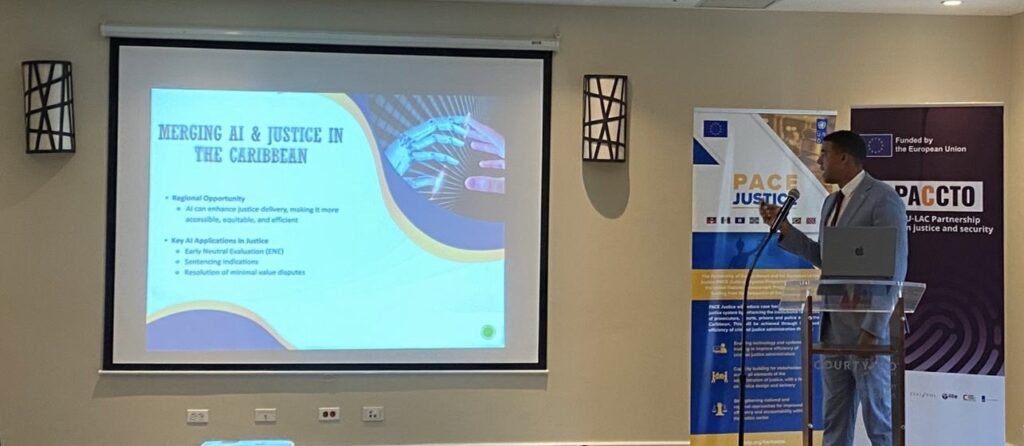BASSETERRE, Saint Kitts – May 17, 2025 – Saint Kitts and Nevis is emerging as a regional leader in digital justice reform, as Attorney General and Minister of Justice and Legal Affairs, the Honourable Garth Wilkin, unveiled the nation’s cutting-edge artificial intelligence (AI) strategy to tackle court backlogs, during a high-level workshop hosted by the United Nations Development Programme (UNDP) and the European Union, recently held in Barbados.
Speaking at the Workshop on Artificial Intelligence and Digital Transformation in Criminal Justice—a joint initiative of the UNDP PACE Justice Project and EL PAcCTO 2.0—Attorney General Wilkin outlined how the twin-island Federation is integrating AI to streamline justice delivery and boost public access to legal information. He posited that AI can help Caribbean States to reduce backlogs in their civil and criminal justice systems, through AI-driven Early Neutral Evaluation, Sentencing Indications and Resolution of Minimal Value Dispute solutions.
At the centre of his presentation was VoiceIt, the Caribbean’s first government-deployed legal AI assistant. Developed locally and trained on the laws of Saint Kitts and Nevis, the platform provides free, plain-language legal guidance through WhatsApp and web chat. According to usage data, the tool handled over 2,000 public interactions in just three months.
“Embracing innovation and implementing new approaches are not merely academic or fanciful ideas, if done right they can result in real change,” said Wilkin. “AI can help us design justice systems that are faster, more responsive, and ultimately more just—if we deploy it responsibly and regionally.”
The Attorney General emphasized that VoiceIt is a nationally owned, fully scaled tool that is already enhancing public understanding of legal processes, a part of the multi-faceted justice reform strategy, which also includes a broader digital transformation agenda, built on a partnership with the Caribbean Agency for Justice Solutions (CAJS). The Ministry of Justice and Legal Affairs and CAJS are finalizing a Memorandum of Understanding with the aim of modernizing records management, automating legal documents, and strengthen institutional capacity.
Wilkin also stressed the importance of good governance and ethical safeguards in deploying AI in justice systems. He pointed to international frameworks such as the International Framework for Court Excellence (IFCE) as key guides for implementation and oversight. Crucially, he noted, AI must support—never replace—human legal judgment.
The presentation ended with a call to action for CARICOM member states and regional judicial bodies to deepen collaboration on digital justice infrastructure, develop ethical standards, and harmonize data systems across borders.
The workshop brought together legal, policy, and tech experts from Latin America, the Caribbean, and Europe to examine the role of emerging technologies in building more efficient and accessible justice systems.
END



